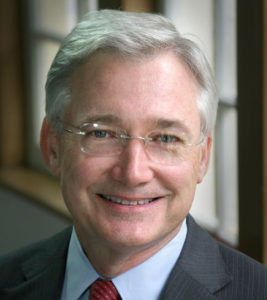One common thread that runs through most of the supporters of President Donald Trump is authoritarianism.
“Politics makes odd bedfellows,” the saying goes; and the taste for authoritarianism has drawn together an unlikely crowd. Many people crave a “strongman” leader, no matter what the social organization is, and the “male-er” the better.

Stephen Shoemaker
Baptists, historically, have shared a healthy distrust of human, temporal authority — and they had a firm biblical foundation. “Put not your trust in princes,” wrote the Psalmist ( 146:1), and when the elders of Israel came to Samuel and demanded that he appoint a king for Israel that they might be a nation like all the other nations of the world, God said to Samuel: “They have not rejected you; they have rejected me from being king over them” (1 Samuel 8: 4-7).
Baptist beginnings in Europe and England protested the authoritarian union of state and church. Baptist churches had no creed, which they saw as “paper-popes.” They stood for “soul competence” and “soul liberty,” which maintained that the individual believer had the spiritual competence to open the Bible and, led by the Spirit, interpret it for his or her life — and if competent, should be free.
They stood for “local church autonomy,” which said the local church was competent spiritually to open the Bible and, led by the Spirit, interpret it for its congregational life — and if competent, should be free. No pope, bishop, association or denomination should dictate to them how to interpret Scripture or direct their life together as a congregation. They stood for “church/state separation” because they had seen the ravages of abuses of power when the two were linked. The cross and the sword are a deadly combination.
“Our only creed is the Bible,” they said, and added that Christ was the measure by which all Scripture was to be interpreted. All these convictions served Baptists well for quite a while.
But in the 1970s we began to see a swing toward authoritarianism in Southern Baptist life. W.A. Criswell said: A deacon-led, laity-led church is a weak church anywhere; a pastor-led church is the only true kind there is. The fundamentalist takeover of the Southern Baptist Convention concentrated first on a campaign to control what was being taught at Southern Baptist seminaries. Adrian Rogers, an early leader in the takeover as SBC president, said, “If the convention says pickles have souls, then that is what the professors should teach.”
“The functional definition of a ‘sacrament’ in the church through the centuries is that a ‘sacrament’ is that which women are not allowed to do.”
And, of course, authority was vested almost exclusively in the male half of the species. In 1984, the SBC in its annual session passed a resolution that said women could not be pastors of churches. The issue was authority, which only men should have.
I have said, with a bit of bitter sarcasm, that the functional definition of a “sacrament” in the church through the centuries is that a “sacrament” is that which women are not allowed to do. So, in Southern Baptist life women were first not allowed to preach from the pulpit. Then that became permissible. But the real crux was that women could not be pastors — because that meant they would exercise authority over men. (The identification of the pastoral role and authority is another whole problem.) The highest sacrament, then, was power.
Authoritarianism in the church was always high in testosterone.
We have seen the rise in authoritarianism in the local church with the rise of super-pastors with spiritual authority over their congregations. Paul said to the Corinthian congregation as super-apostles (hyper-apostoloi) swooped into Corinth to wield power: “Not that we lord it over your faith, we work with you for your joy” (2 Corinthians 1:24). We have seen it in the denomination’s exertion of power over congregations and colleges and universities. We see it today in their support of authoritarianism in government.
There was, said Hans Kung, a Catholic theologian, a “down-ward bent” in Jesus’ life and ministry. The true church of Jesus has this “down-ward bent.”
But we should not despair. The story of the church is a play of darkness and light, discipleship and denial. But by the mystery of God’s grace it has been Christ’s face to the world, his hands and feet and heart. Yes, it also has been Christ’s betrayer, an anti-Christ, a mockery of his name and face. But God in God’s steadfast love has been sure in God’s promise that the Living Christ would be with us always, and this has resulted in the true church being present somewhere in all times and places.
Stephen Shoemaker is pastor of Grace Baptist Church in Statesville, N.C. He served previously as pastor of Myers Park Baptist in Charlotte, N.C.; Broadway Baptist in Fort Worth, Texas, and Crescent Hill Baptist in Louisville, Ky.
Related articles:
Mohler says women should not occupy the Lord’s Day pulpit
What does the SBC tell us about America’s future?
The looming prophetic crisis and the urgency for truth-telling


